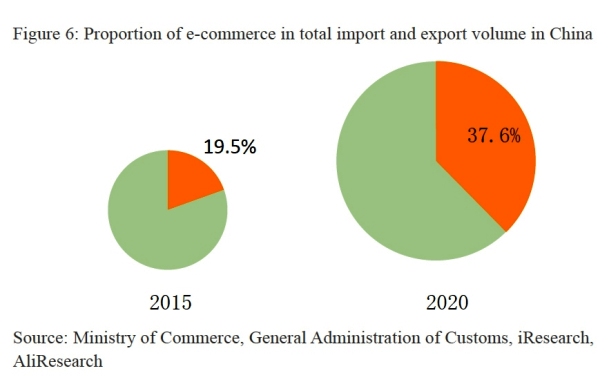
A global economy that is transitioning from the industrial age to the information age presents a “historical opportunity” to boost development in poorer countries and curtail income inequality through wider adoption of new technologies and e-commerce, according to a just-released report from e-commerce giant Alibaba Group’s research arm.
Focusing on the social and economic benefits of China’s rapid adoption of e-commerce as a model for policymakers, the report states that “a completely new business infrastructure built on digital technology is rapidly growing and extending the territory of the ‘new economy.’ “Notonly does e-commerce drive economic growth, it “also distribute(s) the resulting benefits more evenly to every section of society,” the report’s authors concluded.
“To a certain extent, digital technology and e-commerce have fostered a new growth model: inclusive growth.”
The report was released by AliResearch during the United Nations Conference on Trade and Development (UNCTAD) E-commerce Week, taking place April 24-28 in Geneva, to inform discussions surrounding effective approaches to fulfill the UN’s 2015-2030 sustainable development goals. Alibaba Group Executive Chairman Jack Ma is an UNCTAD special advisor for youth entrepreneurship and small business.
Alibaba has cited the job-creating power of the digital economy before, estimating that its China online retail platforms alone have created 30 million job opportunities, with impacts particularly pronounced among youthful entrepreneurs, rural communities and disadvantaged groups. Last year, e-commerce sales in China reached RMB 5.16 trillion ($749 billion), accounting for 15.5% of national retail sales, making it “a pillar of China’s economy instead of supplement,” according to the report.
“E-commerce has created new business norms and transformed the nation’s economic landscape,” AliResearch said. For example, international trade, once dominated by large trading groups, is being reshaped by cross-border e-commerce, which “enables more than 3 billion internet users to buy/sell globally at one simple click,” according to the report. China is home to nearly 40 million MSMEs (micro, small and medium-size enterprises), of which 5 million engage in international trade and contribute about 60% of China’s total export and import volume.
To read AliResearch’s “Inclusive Growth and E-commerce: China’s Experience,” click here.
Beyond oft-cited topline job-creation numbers, AliResearch revealed some surprising ways that technology, the internet and e-commerce boost economic and social inclusiveness by offering a more level playing field for start-ups and small and micro companies:
‚Ä¢ The internet’s geographical reach allows poorer, rural residents to participate in the economy,uncorking bottled-up purchasing power and spurring the expansion of logistics infrastructure into underdeveloped regions.
“E-commerce is the key to narrow the urban-rural gap,” the report said. “Instead of providing monetary assistance, China leverages e-commerce to create a sustainable (rural) business model.” For example, there are more than 1,000 “Taobao Villages” in China with annual online sales exceeding RMB 10 million ($1.45 million). Every additional active online store in a Taobao Village on average creates 2.8 direct job opportunities, AliResesarch said. As of the end of August 2016, active online stores in Taobao Villages had created more than 840,000 direct job opportunities.
• The advent of fintech and the ubiquity of mobile phones provides access to financial services to underserved areas and populations, kickstarting economic growth. Some 100 million Chinese who previously had no or limited loan histories today have credit ratings through Alibaba-affiliated fintech company Ant Financial.
• Cloud computing allows capital-starved MSMEs to rent computer capacity and advanced business software solutions on demand instead of having to sink scarce resources into in-house software and hardware. This gives small companies access to the same computing power large corporations have but at relatively low cost, fostering greater efficiency and innovation.
According to AliResearch, public cloud computing reduces computing costs by 70 percent; Nearly two-thirds of entrepreneurs using services from Alibaba Cloud, Alibaba’s cloud-computing subsidiary, are first-time start-ups.
‚Ä¢ By facilitating a freer flow of information and capital, the internet and e-commerce increases opportunities for companies large and small to collaborate. “Every innovative entrepreneur has easy access to fund(ing), technology, outsourcing, talents, consultancy or strategic alliance,” the report said, stimulating additional commercial activity.
‚Ä¢ Cross-border e-commerce has the potential to give MSMEs not only direct access to consumers across the globe but also access to professional international trade, logistics and financial services, capabilities once reserved mainly for multinationals. In 2015, cross-border e-commerce accounted for 19.5 percent of China’s total import-export volume, a figure that is expected to reach 37.6 percent by 2020, according to AliResearch.
International trade barriers will need to be reduced if SMEs are to compete effectively in the global economy, however. Alibaba and Ma are lobbying for the establishment of the eWTP (electronic World Trade Platform) to help SMEs overcome complex regulations, processes and barriers that hinder their participation in global commerce. Malaysia recently became the first country to agree to host an eWTP trading hub.
“An increasing amount of local, regional, national and international commerce is conducted on a variety of platforms on the internet,” the AliResearch report noted. “This relatively new and comparatively frictionless method of conducting business on the digital platform can enable more countries, enterprises and entrepreneurs to participate in global trade and reap the benefits of globalization.”
Alibaba researchers stressed in the report that “The core of inclusive growth is to effectively provide equitable development opportunities for every section of society.”
“The substantial progress in new technology and new business models since (the) 2000’s, such as internet, internet of things, big data, cloud computing, e-commerce and artificial intelligence, has laid down a solid foundation for realizing the full potential of inclusive growth,” researchers concluded.
Related Content:
Ma’s Call for Inclusive Trade Heard by G20, WTO (Sept. 6, 2016)
U.S. Needs More Globalization, Not Less: Report (Nov. 30, 2016)
At Davos 2017, Alibaba’s Ma Calls for a More Inclusive Globalization (Jan. 18, 2017)





